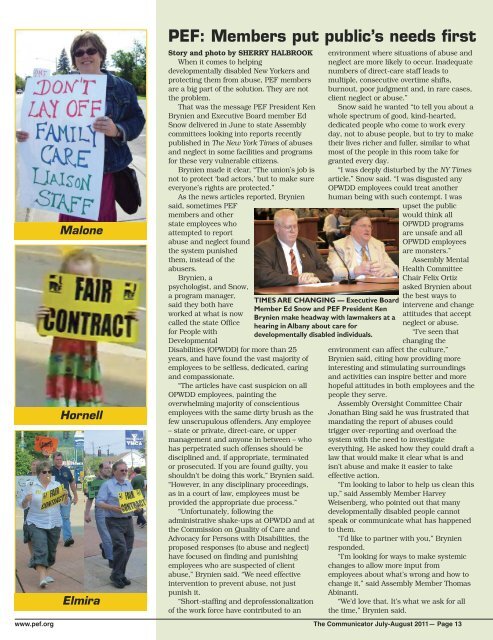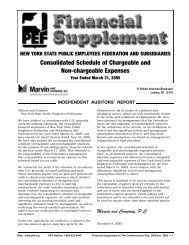s - TheCommunicator.org
s - TheCommunicator.org
s - TheCommunicator.org
- No tags were found...
Create successful ePaper yourself
Turn your PDF publications into a flip-book with our unique Google optimized e-Paper software.
MaloneHornellElmiraPEF: Members put public’s needs firstStory and photo by SHERRY HALBROOKWhen it comes to helpingdevelopmentally disabled New Yorkers andprotecting them from abuse, PEF membersare a big part of the solution. They are notthe problem.That was the message PEF President KenBrynien and Executive Board member EdSnow delivered in June to state Assemblycommittees looking into reports recentlypublished in The New York Times of abusesand neglect in some facilities and programsfor these very vulnerable citizens.Brynien made it clear, “The union’s job isnot to protect ‘bad actors,’ but to make sureeveryone’s rights are protected.”As the news articles reported, Bryniensaid, sometimes PEFmembers and otherstate employees whoattempted to reportabuse and neglect foundthe system punishedthem, instead of theabusers.Brynien, apsychologist, and Snow,a program manager,said they both haveworked at what is nowcalled the state Officefor People withDevelopmentalDisabilities (OPWDD) for more than 25years, and have found the vast majority ofemployees to be selfless, dedicated, caringand compassionate.“The articles have cast suspicion on allOPWDD employees, painting theoverwhelming majority of conscientiousemployees with the same dirty brush as thefew unscrupulous offenders. Any employee– state or private, direct-care, or uppermanagement and anyone in between – whohas perpetrated such offenses should bedisciplined and, if appropriate, terminatedor prosecuted. If you are found guilty, youshouldn’t be doing this work,” Brynien said.“However, in any disciplinary proceedings,as in a court of law, employees must beprovided the appropriate due process.”“Unfortunately, following theadministrative shake-ups at OPWDD and atthe Commission on Quality of Care andAdvocacy for Persons with Disabilities, theproposed responses (to abuse and neglect)have focused on finding and punishingemployees who are suspected of clientabuse,” Brynien said. “We need effectiveintervention to prevent abuse, not justpunish it.“Short-staffing and deprofessionalizationof the work force have contributed to anTIMES ARE CHANGING — Executive BoardMember Ed Snow and PEF President KenBrynien make headway with lawmakers at ahearing in Albany about care fordevelopmentally disabled individuals.environment where situations of abuse andneglect are more likely to occur. Inadequatenumbers of direct-care staff leads tomultiple, consecutive overtime shifts,burnout, poor judgment and, in rare cases,client neglect or abuse.”Snow said he wanted “to tell you about awhole spectrum of good, kind-hearted,dedicated people who come to work everyday, not to abuse people, but to try to maketheir lives richer and fuller, similar to whatmost of the people in this room take f<strong>org</strong>ranted every day.“I was deeply disturbed by the NY Timesarticle,” Snow said. “I was disgusted anyOPWDD employees could treat anotherhuman being with such contempt. I wasupset the publicwould think allOPWDD programsare unsafe and allOPWDD employeesare monsters.”Assembly MentalHealth CommitteeChair Felix Ortizasked Brynien aboutthe best ways tointervene and changeattitudes that acceptneglect or abuse.“I’ve seen thatchanging theenvironment can affect the culture,”Brynien said, citing how providing moreinteresting and stimulating surroundingsand activities can inspire better and morehopeful attitudes in both employees and thepeople they serve.Assembly Oversight Committee ChairJonathan Bing said he was frustrated thatmandating the report of abuses couldtrigger over-reporting and overload thesystem with the need to investigateeverything. He asked how they could draft alaw that would make it clear what is andisn’t abuse and make it easier to takeeffective action.“I’m looking to labor to help us clean thisup,” said Assembly Member HarveyWeisenberg, who pointed out that manydevelopmentally disabled people cannotspeak or communicate what has happenedto them.“I’d like to partner with you,” Brynienresponded.“I’m looking for ways to make systemicchanges to allow more input fromemployees about what’s wrong and how tochange it,” said Assembly Member ThomasAbinanti.“We’d love that. It’s what we ask for allthe time,” Brynien said.www.pef.<strong>org</strong> The Communicator July-August 2011— Page 13















